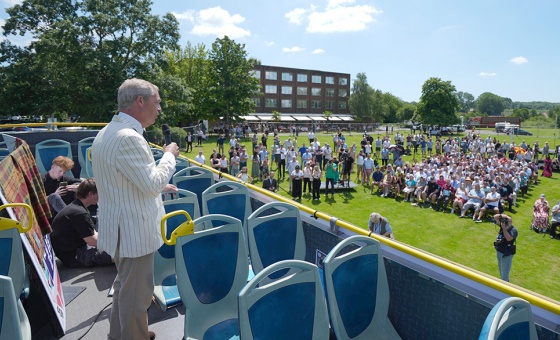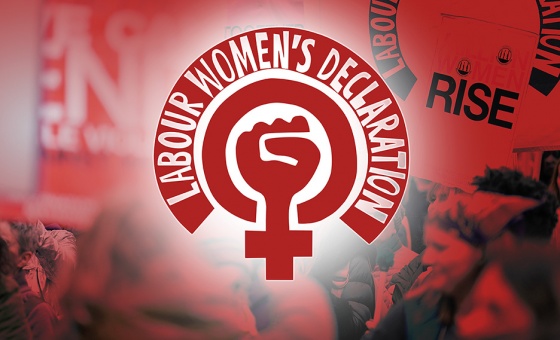This is the last article you can read this month
You can read more article this month
You can read more articles this month
Sorry your limit is up for this month
Reset on:
Please help support the Morning Star by subscribing here
Tonight the Marx Memorial Library’s lecture series commemorating the 150th anniversary of the International Working Men’s Association (IWMA) continues with Professor Malcolm Chase speaking on Chartism, democracy and Marx and Engels.
This free public lecture at Marx House is an opportunity to hear from this leading historian on the roots of Britain’s popular democratic struggle in the very building where Karl Marx sat on the general council of the IWMA.
Marx Memorial Library invites Morning Star readers to join us to explore the lessons of the First International and — as always at Marx House — to participate in the lively discussion afterwards.
John Ellison wrote (It Started Here, M Star September 27) that the International was “the first working-class organisation to make a decisive impact on European politics … the first political organisation in which trade unions participated as affiliated bodies.”
However, the popular democratic movements of England, Wales and Scotland all traced their roots back before industrial societies.
Marx and Engels in the Communist Manifesto insisted: “The first step in the revolution by the working class is to raise the proletariat to the position of ruling class to win the battle of democracy.”
Yet despite the emphasis on the need for the working class to win the national struggle with its own ruling class, comparatively little attention is paid to understanding the revolutionary democratic antecedents of our own trade unions.
While the role of Wolfe Tone was recognised by James Connolly as essential to understanding the historical tasks of Irish workers, the greatest English revolutionaries of the 18th century are largely ignored in discussions of the British labour movement.
Tom Paine (1737-1809), son of Thetford in rural Norfolk, inspired the American Revolution of 1776 through his pamphlet Common Sense and defended the 1789 French Revolution in Rights of Man, was “eagerly read by reformers, Protestant dissenters, democrats, London craftsman, and the skilled factory-hands of the new industrial
north,” according to George Rude.
That Paine — the revolutionary protagonist and elected member of the French National Convention — is more often celebrated today by US Republicans than British socialists or trade unionists must be considered an irony of history.
Indeed, the original proponent of progressive taxation, old-age pensions and basic income, and scourge of organised “revealed” religion could be argued to be the true father of British socialism.
Thomas Spence (1750-1814) from Newcastle first published his penny pamphlet Property in Land Every One’s Right advocating the end of aristocracy and landlords, public ownership of land, collective rents, universal suffrage (including female suffrage), a “social guarantee” of income for those unable to work and “rights of infants” to be free from abuse and poverty in 1775.
Spence’s plan for full bellies, known as “The People’s Farm,” was reissued as The Real Rights of Man and, while in prison in London in 1794 on a charges of high treason, he recalled the first use of that phrase by a miner who dug himself a cave at Marsdon Rocks between Shields and Sunderland about 1780, and chalked over the fireplace: “Ye landlords vile, whose man’s peace mar, come levy rents here if you can; your stewards and lawyers I defy, and live with all the RIGHTS OF MAN.”
The Cato Street Conspirators — named for the London mews where police foiled the assassination of the British Cabinet and PM in 1820 — referred to themselves as “Spencean Philanthropists.”
Marx and Engels were not speaking rhetorically when they wrote in the Communist Manifesto: “The struggle of the proletariat with the bourgeoisie is at first a national struggle. The proletariat of each country must, of course, first of all settle matters with its own bourgeoisie.”
The body of work by historians associated with the Communist Party Historians Group (1946-1956) refounded this study of “history from below” conscious that the Popular Front that had defeated fascism needed to root itself in the popular intellectual and democratic tradition of the British working class.
Professor Chase is the leading Chartist historian in Britain today, author of Chartism: A New History (2007). His first book, The People’s Farm: English Radical Agrarianism, 1775-1840 is a study of the political thought and influence of Spence.
As he points out, the narrative of modernisation that sees the labour movement through its response to the industrial revolution obscures the historical reality that ideas about land reform were vital to the British labour movement and that early British trade unions owed much to forms of workers’ association and ideas about skill that significantly pre-dated the 18th century.
Professor Malcolm Chase will be speaking on Chartism, democracy and Marx and Engels Tuesday October 14 at 7pm. All talks are free and open to members of the public and take place at Marx House, 37a Clerkenwell Green, London EC1.
Alex Gordon is chairman of Marx Memorial Library & Workers’ School








